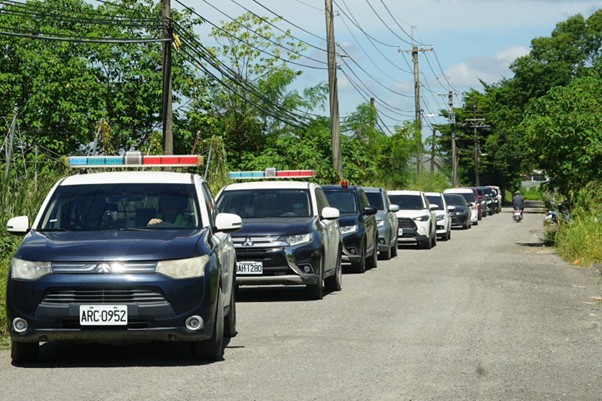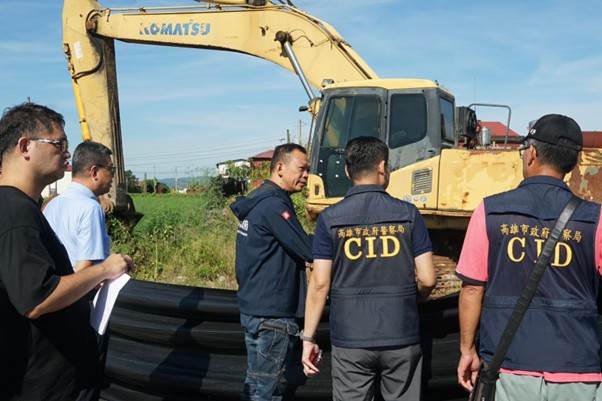More than 1.3 million cubic meters of gravel worth some NT$300 million illegally taken
KAOHISUNG –Locals now sarcastically call the massive craters, some as deep as a six-story building, the “Grand Canyon of Meinong.” The pits were left after farmland and state-owned land were illegally excavated for gravel and then backfilled with construction waste. At least four remain, now filled with stagnant, foul-smelling rainwater.
After reports of illegal mining and dumping, the Qiaotou District Prosecutors Office, working with Kaohsiung police, opened a probe in late August, according to the Liberty Times. Investigators uncovered six hectares of excavation, some plunging 20 meters deep.
Authorities estimate 1.3 million cubic meters of gravel were stolen, generating illicit profits of about NT$300 million (US$9.8 million). Fifteen excavators tied to the operation were seized, and prosecutors sought the detention of 13 suspects, with courts approving custody for two. The excavation is believed to have stripped away soil and gravel equal in volume to 542 Olympic swimming pools, UDN reported.
Mayor Chen Chi-mai, according to reports by ETtoday and other media outlets has vowed zero tolerance. A joint task force with the Qiaotou District Prosecutors Office will seize bulldozers and trucks used in the scheme, he said, while landowners who ignored violations will be forced to restore the damage or see their property auctioned off by the city.

Kuomintang legislator Ko Chih-en (柯志恩), a declared candidate for the 2026 Kaohsiung mayoral race, visited the sites late last week. She criticized the city for its slow response, questioning how such a vast quantity of earth could have been removed unnoticed. Her comments drew online backlash, with Newtalk reporting critics accused her of speaking up only after city enforcement began.
Ko countered that she received complaints in mid-July and inspected the site on July 28 after constituents warned that road foundations might be at risk. She said she recognized the severity of the problem—including groundwater pollution from construction debris and road damage from heavy machinery—and urged officials to act.
Deputy Mayor Lin said the city has begun “intensive blanket inspections,” with the Environmental Protection, Agriculture, Land Administration, and Economic Development bureaus stepping up patrols. Police are installing cameras at key intersections in high-risk areas to prevent more dumping, while drones will be used to spot illegal fencing or non-agricultural structures for immediate removal.
The Economic Development Bureau reported six illegal excavation cases in Meinong this year, flagged by police or through the city’s 1999 hotline. All were fined under the Mining Act, with unresolved cases referred to prosecutors. The crackdown will also expand to Liugui, Shanlin, and Qishan, while the city continues to press the central government to amend mining laws to include criminal penalties as a stronger deterrent.



